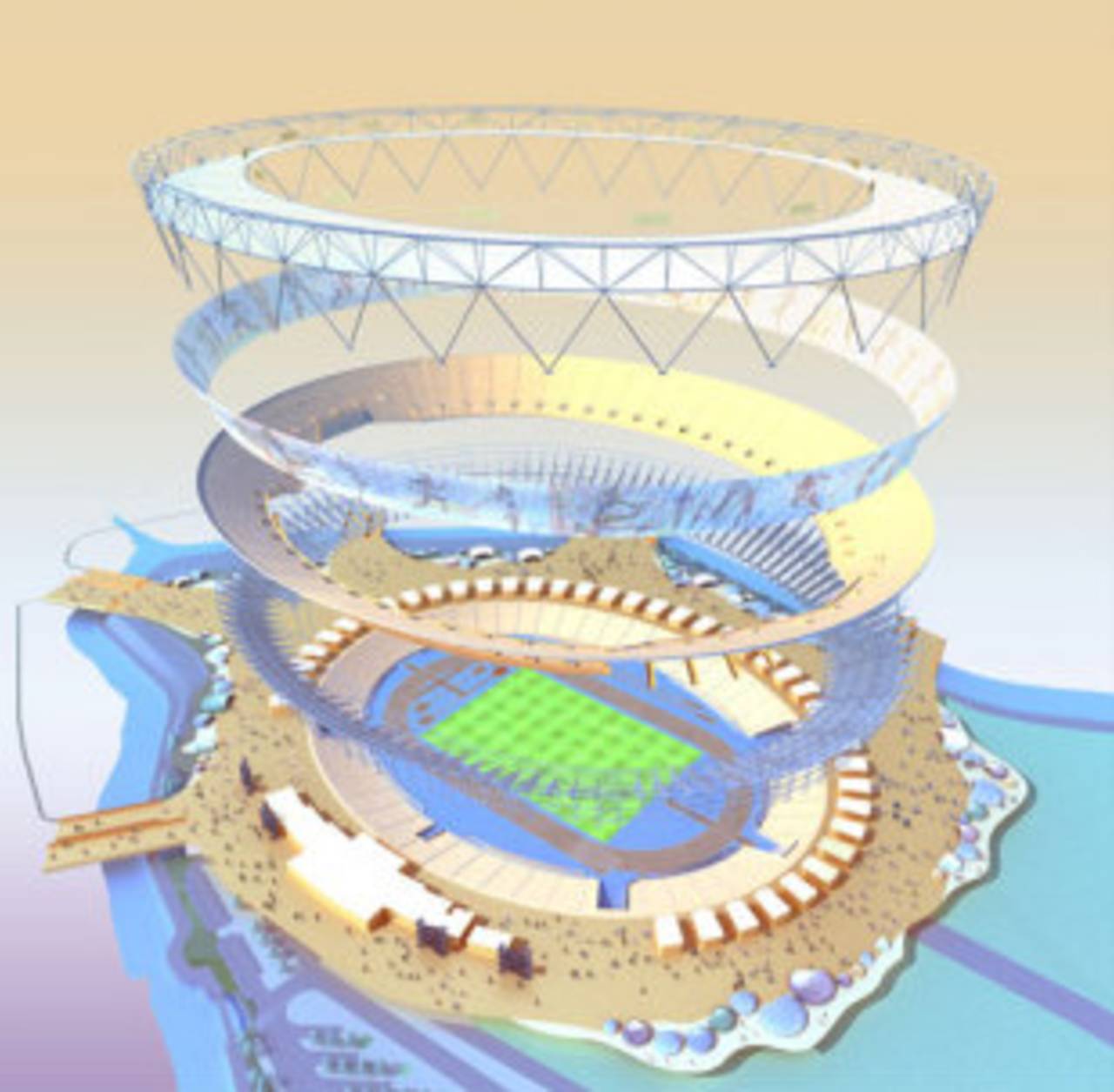The Olympic Stadium in East London has emerged as a potential venue for floodlit Twenty20 cricket, after the London Development Agency (LDA) claimed it had been in talks with the ECB, and two first-class counties, in a bid to firm up a "legacy" for the 80,000-seater venue once the 2012 games have finished.
In a statement, the LDA said it had "engaged with two professional cricket clubs and the national governing body of the sport to explore opportunities for professional cricket (particularly Twenty20 cricket) to be played in the legacy stadium post-2012 and proposes to identify areas within the legacy park where cricket nets and recreational cricket can be played."
The organisers of the 2012 Olympics are determined that the stadium should not be rendered obsolete after the games, and a number of other sports - including London football clubs, rugby league and union, and athletics - have all been approached. However, the exponential growth of Twenty20 cricket, coupled with the current inadequate venue sizes that currently exist around the country, makes the cricket option an especially convenient fit.
Lord's is currently the largest venue in the country, but even it boasts less than half the capacity of the Olympic Stadium, and Middlesex, who play their home games there but lease the ground from the MCC, are excited by the possibilities that have been tabled.
"I think it's a fantastic notion, an absolutely brilliant idea," Vinny Codrington, Middlesex's chief executive, told Cricinfo. "We understand that two counties have been approached, but we are not one of those. However, now that it has been mooted, we might well go back to them and propose it ourselves. We can't play all our matches at Lord's for a variety of reasons, and a stadium of that size would be a real asset to cricket."
Codrington's comments follow on from those of the MCC chief executive, Keith Bradshaw, who told told the Observer in July that cricket at the Olympic Stadium would be a "huge strategic advantage". However, Bradshaw subsequently clarified those remarks in an MCC statement, and vowed that Lord's would "hit the competition head on" if a rival venue came into existence in London.
"There is a difference between considering an idea inevitable and lending support to it," he said. "I believe Lord's is the best place to watch cricket in the country and I intend to keep it that way irrespective of whether another London ground emerges or not. Lord's may be the biggest ground in the country but MCC is determined to retain its intimate, traditional character even if capacity is increased through development. We are a ground and not a stadium, and no one here wants that to change."
When contacted by Cricinfo, the ECB denied any knowledge of the proposal, while Essex is also keeping tight-lipped. However, with an untapped Asian market on the doorstep of the stadium, particularly the vast Bangladeshi community in nearby Tower Hamlets, there are clear economic reasons to bring cricket to the East End.
One London club, however, has already ruled itself out of further discussions. "We were contacted by the Olympic authorities six months ago, asking if the county would be interested," Paul Sheldon, Surrey's chief executive, said. "However we declined, saying that The Oval's facilities were good enough and that such an arrangement would not make financial sense. "
The response from Kent, on the other hand, was positive. "We haven't been approached but we'd be happy to look at imaginative proposals if they were put forward," Paul Millman, Kent's chief executive, told Cricinfo. "Kent has a large catchment area that extends into London, and there is a huge opportunity at present to build on the success and interest in Twenty20 cricket."
Millman added that Kent's immediate priority was to push the development of the St Lawrence Ground at Canterbury, as well as Tunbridge Wells and Beckenham which have proved popular for Twenty20 matches in recent seasons. However, he said that the prospect of hosting 'London derbies' at the Olympic Stadium, against the likes of Middlesex, Essex and Surrey, would be an avenue of particular interest.
What is more, the shape of the stadium is perfectly suited to cricket, which - like athletics - requires an oval-shaped playing surface, unlike football and rugby, which are better suited to rectangular arrangements. The Melbourne Cricket Ground proved how versatile such venues can be when it was refitted for the 2006 Commonwealth Games. In November 2005, the outfield was stripped to lay down a new running track. Four weeks later, the turf had been re-laid ahead of the Boxing Day Test against South Africa; and in March 2006, it was stripped back once more for athletics to take centre stage.
With the LDA increasingly taken by the notion, the chances of the plans getting the go-ahead are beginning to look more favourable. "Given that the public purse has paid half a billion pounds for the Olympic Stadium, it makes perfect sense to examine every possible sporting use in legacy mode alongside the athletics," said the shadow sports and culture minister, Hugh Robertson, back in July.
And more recently, Somerset's chief executive, Andy Nash, delivered a scathing assessment of English cricket's awareness of the possibilities of Twenty20 cricket, following his county's early exit from the ongoing Champions League. "I think back to Twenty20 finals day and it was like watching Des O'Connor," he declared. "It was very flat and very uninspiring. When you go to India and sit in a stadium that is full, the contrast between that and the way we offer up T20 cricket could not be more stark."
Andrew Miller is UK editor of Cricinfo
